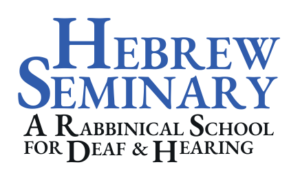In Avodah Zara (19a), we learn that one who learns Torah from only one teacher will never see blessing. At Hebrew Seminary, I had the opportunity to learn from such a diverse group of faculty: not only from across the denominational spectrum, but who had such varied life experiences, and engaged in a wide range of practices. I also greatly appreciated that each one of those teachers was deeply engaged in text, in thinking about God (and their personal relationships with God), and in the different ways in which they participated in the collective endeavor of klal yisrael.
It was truly a blessing to me to begin to understand that there was no single, monolithic way to be (or to do) Jewish, and what that might mean in my own life and personal practice. My education at Hebrew Seminary went well beyond the subjects of the classroom, and included a wealth of personal advice.
— Rabbi Dena Bodian,Hebrew Seminary, Smicha 2010
Hebrew Seminary Course Descriptions
Fall Semester 2018
September 26 – January 24, 2019
Monday
10:00 – 11:30
Jewish Halachah: Pastoral Counseling
Tuesday
11:00 – 1:00
Rabbi Michael Davis
Advanced Biblical Hebrew
1:15 – 2:45
Rabbi Michael Davis
(History) Beyond the Pale:
Exploration of Cherem Across the Ages
Wednesday
10:30 -12:30
Rabbi Marcey Rosenbaum
(Bible) Parashat Hashavuah, with Rashi Commentary
This class will include practice reading texts aloud, pausing to then translate with a goal towards fluency.
Thursday
12:00 – 1:30pm
Debbie Fink
American Sign Language – multi level
This will be a multi-level class beginning with a four-week review of chapters 1-8 to bring everyone up to speed from the summer break. Page-by-page work will begin with Chapter 9 and include plenty of time for conversational practice.
2:00-4:00
Rabbi Daniel Vaisrub
(Talmud) The Status of the Heresh in Jewish Law
We will begin our inquiry into the status of the heresh (a deaf person) in Jewish law by first laying the groundwork of the fundamental concepts and principles that underlie Jewish law altogether—the notion of the individual as being created b’tzelem elohim (in the image of God), and the resulting kavod habriot (human dignity) ascribed and granted to the individual as a result. We will then look at the notion of halachic obligation and its relationship to these fundamental Jewish concepts. Finally, we will look at the specific case of the heresh, and ask the questions: Who exactly is the heresh? What is the halachic status of the heresh? How does the status of heresh differ from that of those who are blind, etc.? What might the intentions of the Rabbis have been in assigning this status to the heresh? Punitive? Protective? Descriptive? How does the ability to communicate (verbally, in writing, in gesture, etc.) affect the status of the heresh? How does the ability of others to communicate with the heresh affect his/her status? While often grouped with the “shote v’katan,” how is the status of the heresh different? What is the halachic trajectory of the status of the heresh, i.e., how has that status evolved? What does it mean to be “lav bar da’at”? What are the components of da’at? Do we have insights into the reality of the life of the heresh that would change any of the above rabbinic definitions or halachic decisions? If so, what are they? Should the halachic status of the heresh be changed? If so, what are the various approaches we might take to change the halachic status of the heresh?
Sunday
12 noon – 1:30pm (begins Oct 14th)
Rabbi Dr. Douglas Goldhamer & Linda Clark
Astrology, Kabbalah & Hebrew Commentaries
Jewish astrology includes a spiritual belief in God. To live out this belief and follow the stars requires some flexibility as medieval and early modern Torah commentaries and Kabbalistic texts reveal. In Astrology, Kabbalah & Hebrew Commentaries, Rabbi Dr. Douglas Goldhamer will enthusiastically share these often overlooked texts as well as the historic backstory.
Hebrew Seminary students will be taught how to translate mystical Hebrew texts by such scholars as Rashi, Ibn Ezra and the great mystic Nahmanides.
Linda Clark will teach contemporary astrological principles and schools of thought and discuss how the modern perspective compares and contrasts with the Jewish texts.
Ms. Clark has been actively learning Astrology since her youth. She is a member of the American Federation of Astrology, the Magi Society and the International Society for Astrological Research.
Rabbi Goldhamer will provide copies of the Jewish texts assigned for student translation and study.
1:30 – 3:00pm
Rahmeil Drizin
(Zohar) Petachat Eliyahu from the Tikkuney HaZohar (17b)
Learn about the secrets of the universe in the famous section Petachat Eliyahu from the Tikkuney HaZohar (17b) that is found in the beginning of many Sefardic and Chassidic prayerbooks.
We are told by the Chida that reciting this selection is beneficial for opening one’s heart to successful prayer.


Leave A Comment
You must be logged in to post a comment.